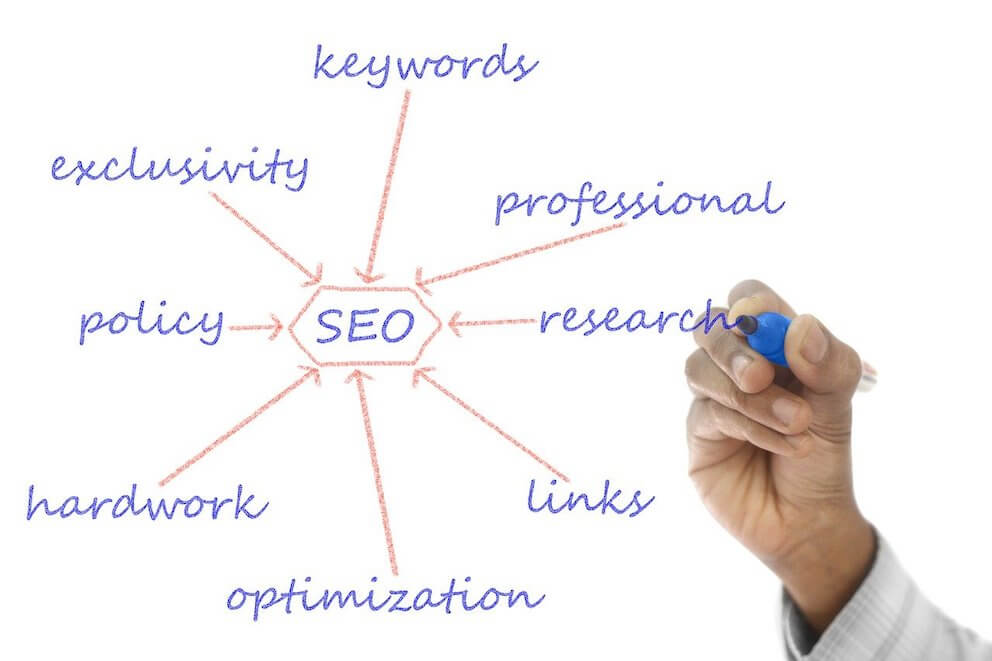
If you have a website and an online presence, then chances are that you’ll have heard of search engine optimisation or SEO for short…
And chances are, you’ll have probably been told from various sources that SEO is really important for your website and your business…
And you may be thinking that yes, you know SEO is important and sort of understand why… but not fully?
So why is SEO important, especially for a small business?
What Is SEO?
SEO is the process of improving the visibility of a website or a web page in a search engine’s unpaid results.
The idea is to optimise your website’s content so that when search engines come across it, they deem it to be worthy of being ranked high in their search results.
Why Is SEO Important?

Your online business may be selling amazing products or your website may have amazing content, which you know will really benefit people that are interested in it… but if you don’t rank in search engines on the first few pages, then it doesn’t matter how good your products are or how good your website articles are because no one’s going to get to see them… they won’t know they exist, because they can’t see them.
This is why SEO is so important to any online presence – basically it allows you to be seen online, it puts you in the shop window so to speak.
But not only this… it also allows you to be seen by people who are actually looking for what you have to sell.
Let’s give an example – say you have a business that sells a specific type of product, for example a hiking tent, and you want to advertise it… so, you take out an ad in the local newspaper or you advertise on a billboard… many people will see these ads, but most of them will have no interest in purchasing a hiking tent – this is non-targeted advertising that is basically just thrown out there with the hope that someone who might be interested in your product will see it.

Whereas imagine someone walks into a camping store with the intention of buying a hiking tent and they see the tent that you are selling as the main feature, right in front of them, with all its advantages listed for them to see…
This is what SEO does for your website – if someone types ‘hiking tents’ into a search engine, it means they’re actually looking for a hiking tent, otherwise they wouldn’t have typed in that search query… now if your website pops up on the first page… well, its just like them walking into that camping store and seeing your tent, right there in front of them.

SEO generates very specific, high-intent traffic, or in other words it targets people who are actually looking for what you have to offer.
The benefits are pretty clear – free, continuous, passive traffic to your website month after month…
So How Does It Work?

There are a number of search engines that are used worldwide – but by far the one with the biggest share of the market is Google, with over 90% of searches made through this search engine.
There are several aspects to how SEO works… but before we go into that – let’s have a look at what search engines are attempting to achieve.

The primary function of a search engine is to find pages that contain high-quality, relevant information pertaining to the searcher’s query… and it does this by ‘crawling’ through your website and determining if the content that is found there is relevant to what the searcher is looking for.
Complex algorithms are used to achieve this – and the basic aim of SEO is to send the right signals to the search engine to convince it that your web page has the best, most relevant and most useful answer to the question or query that the searcher has entered.
Websites that have the following three criteria will rank higher in search engines results pages (SERP):
- Authority
- Relevance
- Trust
There are a number of factors that influence how the search engines determine this, the main ones being:
Keywords & Content

Keywords are the words and phrases (or search queries) that people type into search engines to find what they’re looking for.
Using these keywords in the title of your article and in the content will help search engines to match your web page to the relevant search queries.
There’s an art to finding the right keywords to use… you should choose ones that aren’t used by a lot of competing websites, otherwise it will be difficult to rank high in search engines results pages (SERP).
There are research platforms that offer tools for keyword research, enabling you to choose the ones that will allow for best ranking in SERP – one of the best platforms for this is Jaaxy.
In addition to this, the content of the article should be relevant to what is being searched for.
It’s important not to over stuff the content with keywords, such that the article doesn’t read well and doesn’t make sense… the search engine algorithms can detect these types of tactics and will severely penalise your website for this.
Authority
Search engines want to link users with the website that it feels is in the position to give the best and most qualified answer to the query… or in other words the most ‘authoritative’ site.

Many factors are used to determine this, but one of the main ones is external links…
If other websites are linking to your article and referencing it in their pages and posts, then that is a big indicator to search engines that you have a site that is trusted by others… especially if other authoritative sites are linking to yours.
Relevance
This was alluded to in the keyword section and refers to how well the information found on the website corresponds to a search query.
As was mentioned before, the content of the article should be relevant to what is being searched for.
Other criteria that are looked for by search engines in relation to relevance are alt tags for images and the meta description.
Trust
There are many things that search engines use to determine the ‘trust’ of a website, below are some of the more important ones.
- Domain age
- Newer sites (less than six months old) will find it harder to rank, but as the age increases it will get easier – but this in itself won’t be enough… even if a site is several years old, but doesn’t have the other factors in place that affect SEO – then it won’t help.
- Quality of incoming links
- In the past, having a huge number of external links to your website was a good way to improve SEO… it didn’t matter if they were low quality – coming from spam websites or from websites that are active in a spam environment, such as gambling sites.
- This has now changed… search engines are very good at detecting these types of links and your SEO will be affected very badly if these are used.
- What will help your SEO is high quality links from websites that are in the same niche as you, especially if they are from authoritative sites.
- Quality of content
- This is also used to determine trust.
- Content text that is free of grammar or spelling mistakes and reads well will positively influenece SEO.
- The use of high-quality images that are clear and not grainy and making sure any images used are not copyrighted.
- Duplicate content copied from other websites will be picked up and will negatively affect SEO.

Other Factors That Influence SEO
Page Interaction
Search engines love a website that users interact with as it indicates an active and evolving site that provides a useful and valuable user experience.
So its a good idea to have a comment section at the bottom of all your web pages and posts as this will allow readers to leave feedback, comments and questions.
Security
The website should create an encrypted connection between itself and the web browser of the person who is viewing your website.

This prevents a third party from being able to view the information that is shared between the two ends and thus protects the user from having any information stolen, such as personal or financial details.
Search engines do not like unsecure websites and this will affect SEO drastically.
The Website Should Be ‘Accessible’
This is a website that has features geared to allowing people with disabilities to access it more easily.
You can read more about accessible websites here.
Page Speed
The website’s pages should load quickly and not lag, this includes when the page is opened on mobile devices (mobile page speed).

This is crucial and has a direct influence on SEO.
A study was conducted by Geoff Kenyon, in which he compared website speeds against the rest of the web, the results are as follows:
- if your site loads in 5 seconds, it is faster than approximately 25% of the web
- if your site loads in 2.9 seconds, it is faster than approximately 50% of the web
- if your site loads in 1.7 seconds, it is faster than approximately 75% of the web
- if your site loads in 0.8 seconds, it is faster than approximately 94% of the web
The Site Should be Mobile Friendly
A mobile friendly site is one that when loaded on a mobile device opens in a modified way, such that it is easy to view and navigate.

Conclusion
Search engine optimisation is incredibly important for making sure that your website is seen by the people searching the internet for what you have to offer.
If done correctly it will allow your website to be showcased to the 4 billion plus people using the internet… obviously, not all of them will be searching for what you have to offer, but a percentage will be – and even a small percent of 4 billion, is still a very significant number.
Check out my top recommendations for building and growing a website, including managing all aspects of your SEO here.
I hoped you’ve enjoyed this post – if you have any questions or comments, then please post them below and I’ll get back to you as soon as possible.
Mohammad


Hi Mohammed, because of you I know the definition of SEO and why it’s important. Thanks for explaining how it works and by the way this is fascinating and really so cute, I am going to share it with my friends as soon as possible. Again thank you for sharing this article and your tips as well. Regards, Ismail
Hi Ismail, thanks for your comment.
I loved you article. There is so many great advices and instructions on how to succeed in making a good website and ranking it high on Google. I am glad that I found your site, this is a very detailed and informative article, loved it. Keep up the good work and I am sure you will help a lot people with your content.
Hi Barbara – thanks for your comment, glad you found the article useful.
I love the way you broke down SEO. You gave a vivid explanation so now I know what it is and how it pays a huge part in creating and keeping a healthy websites. Your pictures had me at hello as they are very big bold and visual. Overall you have a really great website with amazing content and I would love to see more
Thanks for the feedback.